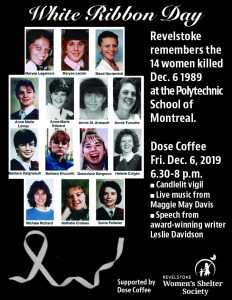Though it happened 30 years ago, the murder of 14 young women still haunts us. Not only was it considered the worst mass-shooting in Canada’s history, but it was made even more disturbing by the fact that these individuals were targeted and killed because of the fact that they were women. This Friday, December 6, is the 30th anniversary of the Montreal Massacre — a day of remembrance and also a reminder that complacency towards hate can have devastating consequences.
The Revelstoke Women’s Shelter Society invites the Revelstoke community to join them at Dose for an evening of expression, reflection and healing. A candlelit vigil will be held from 6:30-8pm on the 6th, featuring thoughts and reflections from community members, including local musician Maggie May Davis. The audience will also hear from CBC award-winning writer, poet and feminist Leslie Davidson.
At the time of the massacre, Davidson was a young, working mom with two small daughters, aged nine and four. She said it was frightening, “I was shocked beyond comprehension to learn that the shooter said he was targeting femin ists, as if his victims were to blame for attracting this violence because of their education and career choices.”
ists, as if his victims were to blame for attracting this violence because of their education and career choices.”
Davidson presented her impactful poem Women of a Certain Rage at the shelter’s Dec. 6 event two years ago and the shelter is delighted to have her return.
Davidson points out that our collective sorrow for December 6 is only meaningful if we, as a culture, commit to nurturing strong and kind young women and men. “So the violence stops and no one is ever again targeted because they challenge the status quo or because they are poor or vulnerable, or simply because they are women,” she said.
Local folk music artist Maggie Davis will also be holding space at the vigil through her song. “Too often, violence –in its many forms–goes unrecognized. Many of us have either experienced it, heard about it, or witnessed it with little resources to direct our concerns. Together, both men and women can break down the barriers of this ‘muted’ epidemic and raise awareness to its many victims,” she says.
A national day of remembrance
December 6th has been recognized as a National Day of Remembrance and Action on Violence Against Women, or, White Ribbon Day.
On December 6, 1989, an armed 25-year-old man walked into École Polytechnique, an engineering school affiliated with the University of Montreal. During his rampage he separated men from women and declared his hatred of feminists. His suicide letter listed names of feminists he wished to kill.
The 14 women he killed (twelve engineering students, one nursing student and one employee of the university) were: Geneviève Bergeron (21), Hélène Colgan (23), Nathalie Croteau (23), Barbara Daigneault (22), Anne-Marie Edward (21), Maud Haviernick (29), Barbara Kluzcnik Widajewicz (31), Maryse Laganière (25), Maryse Leclair (23), Anne Marie Lemay (22), Sonia Pelletier (28), Michèle Richard (21), Annie St- Arneault (23), Annie Turcotte (20). Also injured in the attack were ten women and four men.
The massacre is especially disturbing because the killer saw these women – future engineers and professionals – as a threat embodying progress in women’s equality. This was unequivocally an act of fear and hate.
What continues to be scary is that violence against women is still so present today. Women are most at risk of harm from their intimate partner (Statistics Canada) and a report on femicide (the killing of a female on account of her gender) by the Canadian Femicide Observatory for Justice and Accountability states that in Canada, 148 women and girls were killed in 2018. Between 2016 and 2018, between 131 and 140 Indigenous women and girls have gone missing, have been murdered or have had otherwise suspicious deaths.
But there is more to violence against women than physical. The #MeToo movement showed that women experience a variety of subtler forms of violence on an all too regular basis. A snide comment. Lesser pay. An “accidental” brush of a hand. A career bump for a sexual favour. We can recognize and legitimize something concrete like statistics, but it’s the pervasive acceptance and sum of all these small acts, and dismissive, lax sentencing of sexual assault offenders, that create the subtle message to women that their lives and bodies matter less. This is why we cannot forget about the Montreal Massacre.